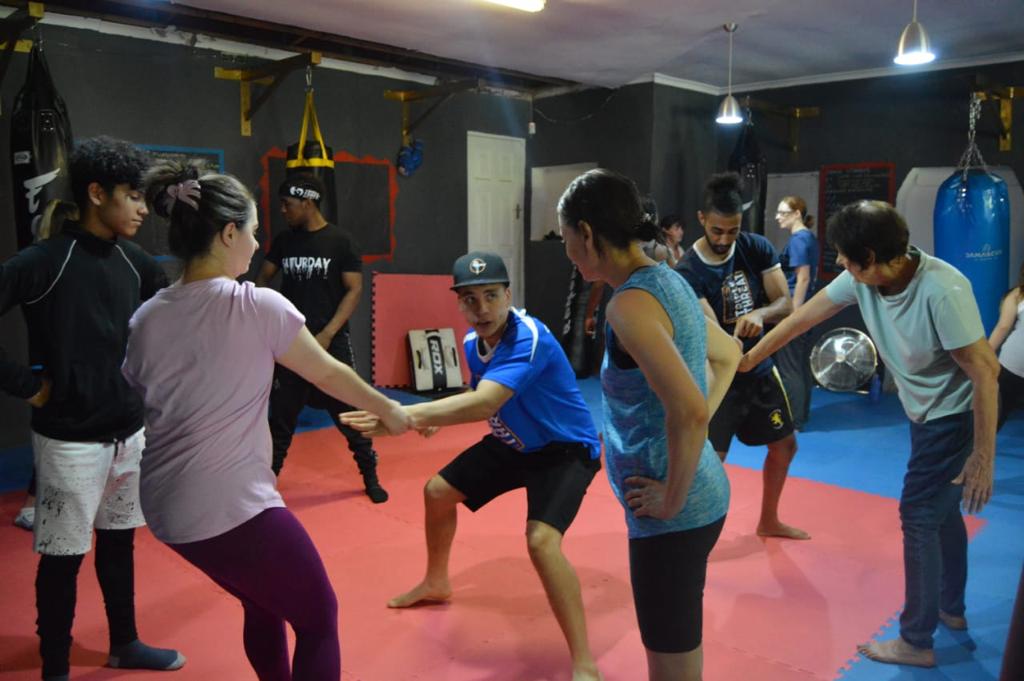Photo by [Triple Threat]
At Triple Threat Dojo, self-defence is more than just fighting or learning to defend oneself from a would-be attacker. As the seven-time South African Kickboxing Champion put it, self-defence is about overall “empowerment”.
For some years, Wade Rendall, owner and head coach at Triple Threat, offered free self-defence classes to the public. While the initiative focused more on women, it was readily available to anyone who wanted to learn.
The classes began as a way to provide a basic understanding of self-defence and bring awareness to prominent challenges facing women, such as Gender-Based Violence.
“A lot of [women] think they’re smaller, not as strong or strong-willed when defending themselves [against attackers]. We [at Triple Threat are] trying to change that stigma around defending yourself.”
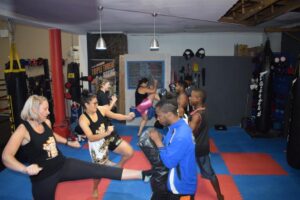
Women practicing their front kicks with fighters.
Unfortunately, women remain the primary victims of physical abuse and harassment in South Africa. As such, they tend to feel insecure in unwarranted encounters or places.
However, there is a growing consensus amongst South African women that enough is enough. It is no longer feasible to constantly live in fear. Instead of sitting idly by, most women now participate in self-defence classes or join full-time combat gyms.

Coach Jay teaching proper form with palm strikes.
On the Fence of Self-Defence
With that being said, there are still mixed feelings regarding self-defence. Some believe it begets violence and hostility, while others believe in its value and necessity.
However, Coach Rendall leans towards the latter. He believes knowing how to defend oneself is essential, especially given the crime rate in the country. Knowing how to protect yourself and loved ones apply to both men and women.
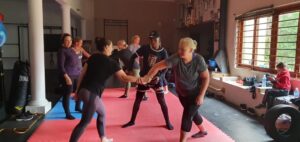
Coach Jay running defensive technique drills.
“The reason why we feel it’s necessary is that it’s a lot more preventative than [fighting]. Once someone identifies situations where self-defence is needed, they tend to avoid it by being more cautious. [And] if they’re put in a state [where defence is necessary], they have the skills to defend themselves.”
Therefore, self-defence doesn’t promote physical violence, bullying or assault, and people shouldn’t be lured into a false sense of security. It is a preventative and defensive measure encouraging awareness of dangerous situations.
And as the saying goes, it’s better to have it and not need it than need it and not have it.
SMread| Wake up, South Africa – before it’s too late
Benefits of Learning Self-Defense
In addition, self-defence is more than improving physical ability. It teaches and instils inner qualities such as self-discipline and self-control. Moreover, it replaces insecurity with self-belief and doubt with assurance. Coach Rendall calls this process “channelling your inner warrior spirit”.
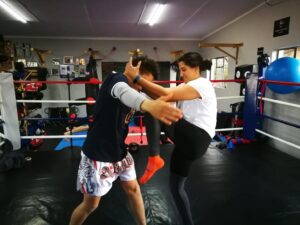
Coach Rendall teaching client how to knee kick.
There are numerous benefits to learning self-defence. “It’s a different approach to fitness. Some of the routines are quite physical, so you’re not only learning how to defend yourself.”
Coach Rendall said, “One of the benefits is that you become a lot more self-conscious… So, when you’re out there, it becomes almost second nature. Instead of you having to think about being aware of your surroundings, it happens instantaneously. Allowing you to prevent situations where self-defence is needed.”
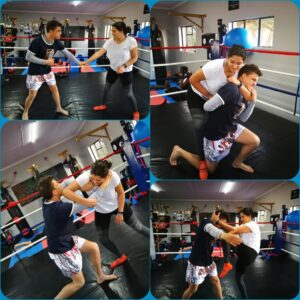
Coach Rendall with client, going through some evasive maneuvers.
He added, there’s a diverse group of people, with different backgrounds, who attend his self-defence classes. In his experience, he’s noticed positive changes in the participants. They often leave feeling more confident and empowered in their ability to defend themselves if the need arises.
However, the downfall is if participants don’t practice regularly, they tend to fall back into old habits. Therefore, as with any skill, practice is the key. People attending classes are urged to be consistent with it and not give up, as they will be learning skills that can be used throughout their lives.
